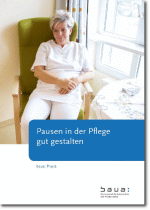- Projektnummer: F 2431
- Projektdurchführung: Federal Institute for Occupational Safety and Health (BAuA)
- Status: Abgeschlossenes Projekt
Projektbeschreibung:
At a time when work can be highly intense and complex, adequate and successful recovery processes are of great significance if employees’ health and workability are to be preserved. This is why it is also necessary for occupational safety and health (OSH) provision to tackle risk factors with potentially negative effects on recovery and strengthen resources that function as protective factors. However, a significant proportion of employees in Germany suffer from the consequences of impaired recovery and report problems recovering from work, for example because they are unable to distance themselves from their jobs in the evenings, they miss rest breaks, or their rest periods are cut short by work activities during what should be free time.
The "Recovery within and beyond the context of work" project was intended to gather extensive information about the interactions between working conditions, recovery, and strain. It was concerned, firstly, with recovery in work contexts (e.g. rest break arrangements and variations in mental and physical demands) and, secondly, with how people recover after work.
Various time frames were considered, from weeks to months and years. Interviews, observations, surveys, and secondary analyses of the large data sets held by the Federal Institute for Occupational Safety and Health (Bundesanstalt für Arbeitsschutz und Arbeitsmedizin, BAuA) were carried out for this purpose during the project, looking at data from the Study on Mental Health at Work (Studie zur Mentalen Gesundheit bei der Arbeit, S-MGA), the BAuA Working Time Survey (Arbeitszeitbefragung, AZB), and the Employment Survey (Erwerbstätigenbefragung) conducted by BAuA with the Federal Institute for Vocational Training (Bundesinstitut für Berufsbildung, BIBB). One priority was the investigation of knowledge and service work.
It became apparent that employees primarily connect recovery with free time and less with rest breaks at work. As far as the statutory provisions concerning rest breaks are concerned, the study established that the rules on regular task changes and brief rest breaks for people using display screen equipment (DSE) were frequently not implemented. It would appear sensible to raise awareness of these issues among organisations and employees who do DSE work. The analysis of the available data sets revealed that, above all, employees who work with people a great deal find recovery difficult. These groups include managers, teachers, retail employees, and health sector workers.
Overall, the findings from various sub-projects indicate that social relationships and interactions in the workplace are important for recovery processes and therefore have to be taken into consideration when designing work in ways that promote recovery. This is all the more important because the project’s results also show that inadequate recovery is associated with disadvantageous outcomes for employees and organisations alike. Options for the optimisation of working conditions and the design approaches required to boost recovery were identified at various levels: the organisational level (e.g. a recovery-friendly organizational climate), the team level (e.g. behaviour by managers and colleagues that aids or hinders recovery), and the employee level (e.g. where individuals choose to spend their rest breaks). Situational and behavioural interventions for practical situations were derived from the results and disseminated through various publications, including two BAuA Guidance brochures, one on effective rest break management in the nursing and care sector and one on mental recovery from work and learning how to switch off.


